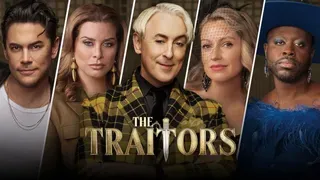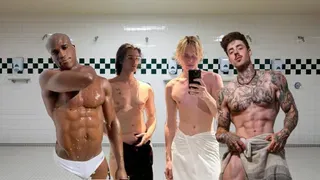September 9, 2024
Missive from Venice – What Were the Queer (and Queer Adjacent) Films?
Frank J. Avella READ TIME: 13 MIN.
'Joker: Folie à Deux'

Do yourself a favor and don't go to see "Joker: Folie à Deux" if you're expecting any kind of Joker incarnation you have seen before. This film defies expectation by holding up a mirror to where we are as a society right now. Yes, it's grim and bleak. It's also fucking brilliant.
Writer-director Todd Phillips and co-writer Scott Silver have delivered a raw, emotional, highly ambitious, and unique cinematic ride. And it's a musical!
Set two years after the original film, in which he murdered six people, an emaciated, over-medicated, and soul-sucked Arthur Fleck (Joaquin Phoenix) is in a psychiatric prison awaiting trial and being bullied by his guards. Outside, his Joker persona has become a media sensation. In prison, he meets Lee (Lady Gaga), a.k.a. Harley Quinn. They instantly bond. It's obvious she is a "fan," and she believes in him – well, she believes in Joker.
Fleck's lawyer, Maryanne Stewart (Catherine Keener), is busy mounting a split personality defense. Basically, Fleck committed those heinous acts because of the horrific trauma he experienced as a child. Lee is not having it. She wants him to proudly stand tall as a vigilante hero.
Fleck's emotional journey – and Lee's – are expressed through a host of keen and clever musical moments, many quite sad and poignant, some rousing and ebullient. From "Get Happy" to "We're Gonna Build a Mountain" to "If My Friends Could See Me Now" to "That's Entertainment," each song is reinterpreted from its original film musical usage to convey something darker, deeper, more pained, more human.
Phoenix is masterful, and he and Gaga make an awesome screen team. She is sublime. Het role is smaller than expected, but she makes the most of it and delivers her best screen performance to date.
In the end, as grim as "Joker" can be, it also leaves room for redemption, which might come in a third installment if audiences stop listening to the naysayers and show up.
'The Room Next Door'

In "The Room Next Door," Pedro Almodóvar's turns his gay sensibilities to a story about a deep friendship between two women and how they show one another just how much they cherish that friendship.
Adapted from segments of Sigrid Nunez's novel "What Are You Going Through," the film tells the story of two successful authors. Ingrid (Julianne Moore), is at a book signing when she is told that her estranged friend, Martha (Tilda Swinton), a former war correspondent, is losing a battle with cancer. Ingrid rushes to her side, and the two rekindle their bond – and it grows even deeper.
Martha's condition is grave, and even a new experimental treatment cannot help her. She has decided to end her life, via a pill she's purchased on the dark web, and she wants Martha to be in the room next door when she does it.
There are none of the expected Almodovar twists and turns here. The story is quite simple, and strangely transcendent.
Moore is radiant in a performance rich with compassion and understanding.
Swinton is gloriously complex, horrified that she's out of options, yet determined to do things on her terms. It's a raw, naked turn that deserves Oscar attention.
The film's score, cinematography, production, and costume design are all terrific, as is the norm in an Almodóvar película.
The script, by Almodóvar and Sigrid Nunez, is reminiscent of certain Ingmar Bergman and Woody Allen narratives in that those auteurs were constantly exploring themes of death.
Almodovar continues to be one of the few male directors interested in exploring multifaceted women onscreen. He's a true gift to cinema.
'Babygirl'

Dutch filmmaker Halina Reijn ("Bodies Bodies Bodies") has crafted an uber-sexy dark comedy that challenges our idea about sexual power and female gratification.
Romy (Nicole Kidman) is a well-respected CEO whom others look up to. She's married to Jakob (Antonio Banderas), who doesn't fully sexually satisfy her. Otherwise, they're happily married.
One day at work, Romy is taken with Samuel (Harris Dickinson), a hot 'n' cocky young intern. Before you can say water cooler, they're having intense sex, where she is able to live out some power-shifting fantasies. But what of her family?
Kidman has been making edgy and daring choices for most of her career. This is no exception. Her Romy is so repressed and shameful, yet so eager to explore the erotic and taboo. It's fearless, award-worthy work.
Dickinson, a total honorary gay thanks to "Beach Rats" and "Postcards from London," charms the fuck out of both Kidman and the audience. He's a star on a meteoric rise.
One of the best things about "Babygirl" is how, unlike past films (like "Fatal Attraction," "Unfaithful," "Basic Instinct") and the subsequent rip-offs of those films, this one did not feel the necessity to judge or punish the female lead or turn her into a raging psycho because of her unorthodox sexual desires.
The film asks if it's possible to make peace with the sexual deviant in ourselves without shame and judgment, an intriguing question to which "Babygirl," keenly, only hints at an answer.
'Maria'

Angelina Jolie is truly beguiling as the great soprano Maria Callas in Chilean helmer Pablo Larraín's gorgeous, haunting, but somewhat cold film, "Maria." Jolie will receive her third acting Oscar nomination, her first since starring in Clint Eastwood's "Changeling" in 2009. It's that kind of performance.
Set in Paris in the last week of the diva's life, the film chronicles her desire for a comeback, only to realize that her voice is not what it used to be. She's haunted by her simultaneous euphoric and tragic past.
"I'm in the mood for adulation," she says, announcing her decision to eat outdoors, which reminded me of Sally Field's "Soapdish" visit to the mall with Whoopi Goldberg.
The script (by "Spencer" writer Steven Knight) never ventures far enough into who this woman was. But when Jolie is onscreen, especially when she's performing – with vocals by Callas, but interpreted by the actor – the experience is mesmeric.
The film needed more camp, more humor, and less Greek tragedy.
I also, would be remiss if I did not recommend Brady Corbet's towering cinematic achievement, "The Brutalist."
Frank J. Avella is a proud EDGE and Awards Daily contributor. He serves as the GALECA Industry Liaison and is a Member of the New York Film Critics Online. His award-winning short film, FIG JAM, has shown in Festivals worldwide (figjamfilm.com). Frank's screenplays have won numerous awards in 17 countries. Recently produced plays include LURED & VATICAL FALLS, both O'Neill semifinalists. He is currently working on a highly personal project, FROCI, about the queer Italian/Italian-American experience. He is a proud member of the Dramatists Guild. https://filmfreeway.com/FrankAvella https://muckrack.com/fjaklute








